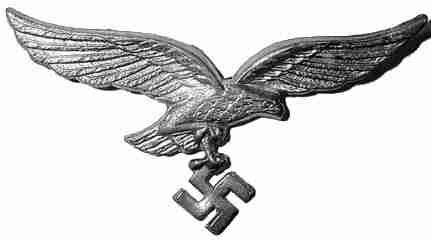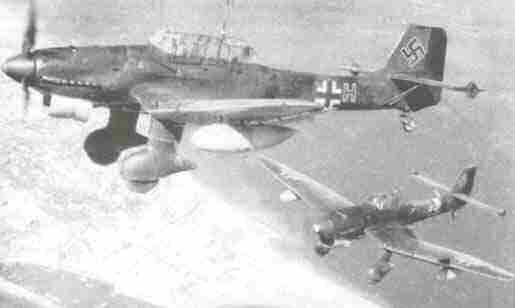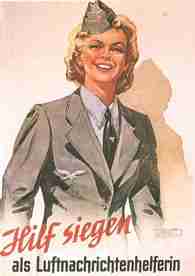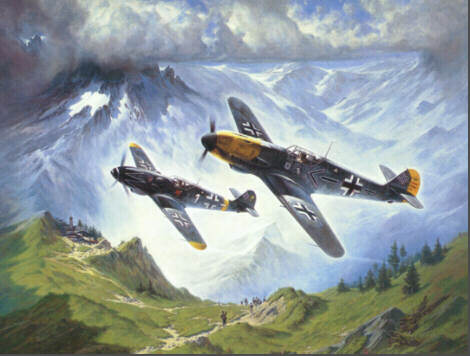Goering: The Luftwaffe

Dr Stahmer: Another matter. What were the reasons for the refusal to take part in the Disarmament Conference and for the withdrawal from the League of Nations?
Goering: The chief reasons for that were, first of all, that the other states who, after the complete disarming of Germany, were also bound to disarm, did not do so. The second point was that we also found a lack of willingness to meet in any way Germany's justified proposals for revisions; thirdly, there were repeated violations of the Treaty of Versailles and of the Covenant of the League of Nations by other states, Poland, Lithuania, et cetera, which were at first censured by the League of Nations, but which were then not brought to an end, but were rather accepted as accomplished facts; fourthly, all complaints by Germany regarding questions of minorities were, indeed, discussed, and well-meaning advice was given to the states against which the complaints had been brought, but nothing was actually done to relieve the situation. Those are the reasons for leaving the League of Nations and the Disarmament Conference.

Goering: When Germany left the League of Nations and the Disarmament Conference, she simultaneously announced to the leading powers concerned her definite decision to aim at universal disarmament. The Fuehrer then made various proposals which, it can be assumed, are historically known: restriction of active armed forces to a certain number of men; restriction of weapons to be used; abolishing of certain weapons as, for example, bombers; and various other points. Each one of these proposals was rejected, however, and did not reach a general realization, nor were even discussed.
When we and the Fuehrer recognized clearly that the other parties did not think of disarming and that, on the contrary, that mighty power to the east of us in particular, Russia, was carrying out an armament program as never before, it became necessary for us, in order to safeguard the most vital interests of the German people, their life and their security, to free ourselves from all ties and to rearm to such an extent as was now necessary for the interests and security of the Reich. That was the first reason for the necessity of reintroducing compulsory service.
Dr Stahmer: To what extent did the Luftwaffe participate in this rearmament?

I was aware from the beginning that protection in the air was necessary as one of the most essential conditions for the security of my nation. Originally it was my belief that a defensive air force, that is, a fighter force, might suffice; but upon reflection I realized--and I want to underline what witness Field Marshal Kesselring said on that subject--that one would be lost with merely a fighter force for defense purposes and that even a defensive force must contain bombers in order that it can be used offensively against the enemy air force on enemy territory. Therefore I had bomber aircraft developed from commercial airplanes.
In the beginning rearmament proceeded slowly. Everything had to be created anew since nothing existed in the way of air armament. In 1935 I told the Fuehrer that I now considered it proper, since we had repeatedly received refusals in answer to our proposals, to declare to the world openly that we were creating an air force, and that I had already established a certain basis for that. This took place in the form of an interview which I had with a British correspondent.

Since nothing had existed before, I should be able to catch up quickly only if aircraft production on one hand were made to work with as many shifts and as much speed as possible, that is with maximum effort and on a mobilization basis, and if, on the other hand, extension of the ground forces and similar matters was carried out at once with the greatest possible speed. The situation in 1936 is defined by me, in that report to my co-workers, as serious. Other states had, to be sure, not disarmed, but here and there they had perhaps neglected their air force and they were catching up on lost ground. Violent debates were taking place in England with regard to modernizing and building up the air force; feverish activities were taking place in Russia, concerning which we had reliable reports--I shall refer to the question of Russian rearmament later."

Dr Stahmer: Several days ago reference was made to a speech which you are said to have made to Air Force officers, in which you said that you proposed to have such an air force that, once the hour had struck, it would fall like an avenging host on the enemy. The opponent must have the feeling of having lost before he ever started fighting with you. I shall have this speech submitted to you and I would like you to tell us whether this speech was known to you and what its purpose was?
Goering: This quotation has been used by the Prosecution twice; once in the beginning and the second time, the other day, in the cross-examination of Field Marshal Milch. This concerns a speech that appeared in a book by me called Speeches and Compositions, which has already been submitted to the Tribunal as evidence. The speech is called "Comradeship, Fulfillment of Duty, and Willingness to Sacrifice," an address to 1,000 flight lieutenants on the day they took their oath in Berlin on 20 May 1936.

I demand of you nothing impossible. I do not demand that you should be model boys. I like to be generous. I understand that youth must have its follies, otherwise it would not be youth. You may have your pranks, and you will get your ears boxed for it. But that is not the decisive factor. The decisive factor is rather that you should be honorable, decent fellows, that you should be men. You can have your fun as much as you wish, but once you get into the plane you must be men, determined to smash all resistance. That is what I demand of you, brave, daring fellows.
Then comes the paragraph, which has just been read. "I have visions" ... "of possessing a weapon" ... "which shall come like an avenging host against the foe." That has nothing to do with vengeance, for "an avenging host" is a terminus technicus, a usual term, in Germany. I might just as well have said that the opponent would use another word to express the same thing. I shall not read any further here, for these words, if I were to read them, would be readily understandable; one has to realize to whom I was speaking."Can't we be friends?"





The Nuremberg Tribunal Biographies
Caution: As always, these excerpts from trial testimony should not necessarily be mistaken for fact. It should be kept in mind that they are the sometimes-desperate statements of hard-pressed defendants seeking to avoid culpability and shift responsibility from charges that, should they be found guilty, can possibly be punishable by death.
Disclaimer:The Propagander!™ includes diverse and controversial materials--such as excerpts from the writings of racists and anti-Semites--so that its readers can learn the nature and extent of hate and anti-Semitic discourse. It is our sincere belief that only the informed citizen can prevail over the ignorance of Racialist "thought." Far from approving these writings, The Propagander!™ condemns racism in all of its forms and manifestations.
Source Note: The trial portion of this material, which is available in its entirety at the outstanding Avalon and Nizkor sites, is being presented here in a catagorized form for ease of study and is not meant to supplant or replace these highly recommended sources.
Fair Use Notice: This site may contain copyrighted material the use of which has not always been specifically authorized by the copyright owner. We are making such material available in our efforts to advance understanding of historical, political, human rights, economic, democracy, scientific, environmental, and social justice issues, etc. We believe this constitutes a "fair use" of any such copyrighted material as provided for in section 107 of the US Copyright Law. In accordance with Title 17 U.S.C. Section 107, the material on this site is distributed without profit to those who have expressed a prior interest in receiving the included information for research and educational purposes. If you wish to use copyrighted material from this site for purposes of your own that go beyond 'fair use', you must obtain permission from the copyright owner.

